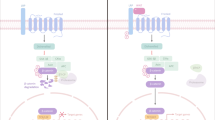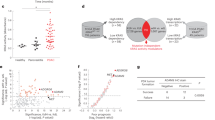Abstract
The ARID1A gene, which encodes a subunit of the SWI/SNF chromatin remodeling complex, has been found to be frequently mutated in many human cancer types. However, the function and mechanism of ARID1A in cancer metastasis are still unclear. Here, we show that knockdown of ARID1A increases the ability of breast cancer cells to proliferate, migrate, invade, and metastasize in vivo. The ARID1A-related SWI/SNF complex binds to the second exon of CDH1 and negatively modulates the expression of E-cadherin/CDH1 by recruiting the transcriptional repressor ZEB2 to the CDH1 promoter and excluding the presence of RNA polymerase II. The silencing of CDH1 attenuated the migration, invasion, and metastasis of breast cancer cells in which ARID1A was silenced. ARID1A depletion increased the intracellular enzymatic processing of E-cadherin and the production of C-terminal fragment 2 (CTF2) of E-cadherin, which stabilized β-catenin by competing for binding to the phosphorylation and degradation complex of β-catenin. The matrix metalloproteinase inhibitor GM6001 inhibited the production of CTF2. In zebrafish and nude mice, ARID1A silencing or CTF2 overexpression activated β-catenin signaling and promoted migration/invasion and metastasis of cancer cells in vivo. The inhibitors GM6001, BB94, and ICG-001 suppressed the migration and invasion of cancer cells with ARID1A-deficiency. Our findings provide novel insights into the mechanism of ARID1A metastasis and offer a scientific basis for targeted therapy of ARID1A-deficient cancer cells.
This is a preview of subscription content, access via your institution
Access options
Subscribe to this journal
Receive 50 print issues and online access
$259.00 per year
only $5.18 per issue
Buy this article
- Purchase on Springer Link
- Instant access to full article PDF
Prices may be subject to local taxes which are calculated during checkout







Similar content being viewed by others
References
Wu JN, Roberts CWM. ARID1A mutations in cancer: another epigenetic tumor suppressor?. Cancer Discov. 2013;3:35–43.
Masliah-Planchon J, Bieche I, Guinebretiere JM, Bourdeaut F, Delattre O. SWI/SNF chromatin remodeling and human malignancies. Annu Rev Pathol. 2015;10:145–71.
Zhu M, Lu TS, Jia YM, Luo X, Gopal P, Li L, et al. Somatic mutations increase hepatic clonal fitness and regeneration in chronic liver disease. Cell. 2019;177:608-+.
Sun XX, Chuang JC, Kanchwala M, Wu LW, Celen C, Li L, et al. Suppression of the SWI/SNF component Arid1a promotes mammalian regeneration. Cell Stem Cell. 2016;18:456–66.
Tsurusaki Y, Okamoto N, Ohashi H, Mizuno S, Matsumoto N, Makita Y, et al. Coffin-Siris syndrome is a SWI/SNF complex disorder. Clin Genet. 2014;85:548–54.
Jones S, Wang TL, Shih IM, Mao TL, Nakayama K, Roden R, et al. Frequent mutations of chromatin remodeling gene ARID1A in ovarian clear cell carcinoma. Science. 2010;330:228–31.
Getz G. Integrated genomic characterization of endometrial carcinoma. Nature 2013;497:67.
Liang H, Cheung LWT, Li J, Ju ZL, Yu SX, Stemke-Hale K, et al. Whole-exome sequencing combined with functional genomics reveals novel candidate driver cancer genes in endometrial cancer. Genome Res. 2012;22:2120–9.
Chandler RL, Damrauer JS, Raab JR, Schisler JC, Wilkerson MD, Didion JP, et al. Coexistent ARID1A-PIK3CA mutations promote ovarian clear-cell tumorigenesis through pro-tumorigenic inflammatory cytokine signalling. Nat Commun. 2015;6:6118.
Williamson CT, Miller R, Pemberton HN, Jones SE, Campbell J, Konde A, et al. ATR inhibitors as a synthetic lethal therapy for tumours deficient in ARID1A. Nat Commun. 2016;7:13837.
Shen JF, Peng Y, Wei LZ, Zhang W, Yang L, Lan L, et al. ARID1A deficiency impairs the DNA damage checkpoint and sensitizes cells to PARP inhibitors. Cancer Discov. 2015;5:752–67.
Berns K, Sonnenblick A, Gennissen A, Brohee S, Hijmans EM, Evers B, et al. Loss of ARID1A activates ANXA1, which serves as a predictive biomarker for trastuzumab resistance. Clin Cancer Res. 2016;22:5238–48.
Hu CB, Li WP, Tian F, Jiang K, Liu XT, Cen J, et al. Arid1a regulates response to anti-angiogenic therapy in advanced hepatocellular carcinoma. J Hepatol. 2018;68:465–75.
Helming KC, Wang XF, Wilson BG, Vazquez F, Haswell JR, Manchester HE, et al. ARID1B is a specific vulnerability in ARID1A-mutant cancers. Nat Med. 2014;20:251–4.
Ng CKY, Piscuoglio S, Geyer FC, Burke KA, Pareja F, Eberle CA, et al. The landscape of somatic genetic alterations in metaplastic breast carcinomas. Clin Cancer Res. 2017;23:3859–70.
Liang X, Vacher S, Boulai A, Bernard V, Baulande S, Bohec M, et al. Targeted next-generation sequencing identifies clinically relevant somatic mutations in a large cohort of inflammatory breast cancer. Breast Cancer Res. 2018;20:88.
Marchio C, Geyer FC, Ng CKY, Piscuoglio S, De Filippo MR, Cupo M, et al. The genetic landscape of breast carcinomas with neuroendocrine differentiation. J Pathol. 2017;241:405–19.
Stephens PJ, Tarpey PS, Davies H, Van Loo P, Greenman C, Wedge DC, et al. The landscape of cancer genes and mutational processes in breast cancer. Nature. 2012;486:400-+.
Cho HD, Lee JE, Jung HY, Oh MH, Lee JH, Jang SH, et al. Loss of tumor suppressor ARID1A protein expression correlates with poor prognosis in patients with primary breast cancer. J Breast Cancer. 2015;18:339–46.
Uncel M, Diniz G, Akoz G, Ekin ZY, Sayhan S, Yardim S, et al. Loss of nuclear ARID-1A expressions is associated with hormone receptor status in breast cancers. Eur J Breast Health. 2019;15:125–9.
Fearon ER. Connecting estrogen receptor function, transcriptional repression, and E-cadherin expression in breast cancer. Cancer Cell. 2003;3:307–10.
Yan HB, Wang XF, Zhang Q, Tang ZQ, Jiang YH, Fan HZ, et al. Reduced expression of the chromatin remodeling gene ARID1A enhances gastric cancer cell migration and invasion via downregulation of E-cadherin transcription. Carcinogenesis. 2014;35:867–76.
Svensson S, Abrahamsson A, Rodriguez GV, Olsson AK, Jensen L, Cao YH, et al. CCL2 and CCL5 are novel therapeutic targets for estrogen-dependent breast cancer. Clin Cancer Res. 2015;21:3794–805.
Zhang Q, Yan HB, Wang J, Cui SJ, Wang XQ, Jiang YH, et al. Chromatin remodeling gene AT-rich interactive domain-containing protein 1A suppresses gastric cancer cell proliferation by targeting PIK3CA and PDK1. Oncotarget. 2016;7:46127–41.
Guan B, Wang TL, Shih IM. ARID1A, a factor that promotes formation of SWI/SNF-mediated chromatin remodeling, is a tumor suppressor in gynecologic cancers (vol 71, pg 6718, 2011). Cancer Res. 2012;72:3116–3116.
Xiao G, Yin Z, Anand M, Vikas M, Ding LW, Lin LH, et al. ARID1A and CEBPα cooperatively inhibit UCA1 transcription in breast cancer. Oncogene. 2018;37:5939–5951.
Bitler BG, Wu S, Park PH, Hai Y, Aird KM, Wang YM, et al. ARID1A-mutated ovarian cancers depend on HDAC6 activity. Nat Cell Biol. 2017;19:962–973.
Sanchez-Tillo E, Siles L, De Barrios O, Cuatrecasas M, Vaquero EC, Castells A, et al. Expanding roles of ZEB factors in tumorigenesis and tumor progression. Am J Cancer Res. 2011;1:897–912.
Pinheiro H, Carvalho J, Oliveira P, Ferreira D, Pinto MT, Osorio H, et al. Transcription initiation arising from E-cadherin/CDH1 intron2: a novel protein isoform that increases gastric cancer cell invasion and angiogenesis(dagger). Hum Mol Genet. 2012;21:4253–69.
Marambaud P, Shioi J, Serban G, Georgakopoulos A, Sarner S, Nagy V, et al. A presenilin-1/gamma-secretase cleavage releases the E-cadherin intracellular domain and regulates disassembly of adherens junctions. EMBO J. 2002;21:1948–56.
Ryniers F, Stove C, Goethals M, Brackenier L, Noe V, Bracke M, et al. Plasmin produces an E-cadherin fragment that stimulates cancer cell invasion. Biol Chem. 2002;383:159–65.
Noe V, Fingleton B, Jacobs K, Crawford HC, Vermeulen S, Steelant W, et al. Release of an invasion promoter E-cadherin fragment by matrilysin and stromelysin-1. J Cell Sci. 2001;114:111–8.
Cespedes MV, Larriba MJ, Pavon MA, Alamo P, Casanova I, Parreno M, et al. Site-dependent E-Cadherin cleavage and nuclear translocation in a metastatic colorectal cancer model. Am J Pathol. 2010;177:2067–79.
Valenta T, Hausmann G, Basler K. The many faces and functions of beta-catenin. EMBO J. 2012;31:2714–36.
Jou TS, Stewart DB, Stappert J, Nelson WJ, Marrs JA. Genetic and biochemical dissection of protein linkages in the cadherin-catenin complex. Proc Natl Acad Sci USA. 1995;92:5067–71.
Kim H, He Y, Yang I, Zeng Y, Kim Y, Seo YW, et al. delta-Catenin promotes E-cadherin processing and activates beta-catenin-mediated signaling: Implications on human prostate cancer progression. Biochim Biophys Acta. 2012;1822:509–21.
Huber AH, Weis WI. The structure of the beta-catenin/E-cadherin complex and the molecular basis of diverse ligand recognition by beta-catenin. Cell. 2001;105:391–402.
Stewart DJ. Wnt signaling pathway in non-small cell lung cancer. J Natl Cancer Inst 2014;106:djt356.
Liu CM, Li YM, Semenov M, Han C, Baeg GH, Tan Y, et al. Control of beta-catenin phosphorylation/degradation by a dual-kinase mechanism. Cell. 2002;108:837–47.
Sadot E, Simcha I, Shtutman M, Ben-Ze’ev A, Geiger B. Inhibition of beta-catenin-mediated transactivation by cadherin derivatives. Proc Natl Acad Sci USA. 1998;95:15339–44.
Simcha I, Kirkpatrick C, Sadot E, Shtutman M, Polevoy G, Geiger B, et al. Cadherin sequences that inhibit beta-catenin signaling: a study in yeast and mammalian cells. Mol Biol Cell. 2001;12:1177–88.
Wang K, Yuen ST, Xu JC, Lee SP, Yan HHN, Shi ST, et al. Whole-genome sequencing and comprehensive molecular profiling identify new driver mutations in gastric cancer. Nat Genet. 2014;46:573–82.
Li C, Xu ZL, Zhao Z, An Q, Wang L, Yu Y, et al. ARID1A gene knockdown promotes neuroblastoma migration and invasion. Neoplasma. 2017;64:367–76.
Xu GT, Chhangawala S, Cocco E, Razavi P, Cai YY, Otto JE. et al. ARID1A determines luminal identity and therapeutic response in estrogen-receptor-positive breast cancer. Nat Genet. 2020;52:198–207.
Wilson BG, Roberts CWM. SWI/SNF nucleosome remodellers and cancer. Nat Rev Cancer. 2011;11:481–92.
Gottardi CJ, Wong E, Gumbiner BM. E-cadherin suppresses cellular transformation by inhibiting beta-catenin signaling in an adhesion-independent manner. J Cell Biol. 2001;153:1049–59.
Acknowledgements
We acknowledge Yi-Yuan Ren, Jia-Hui Li, and Xiao-Qiang Chai for their helps in experiments. The work was supported by the National Natural Science Foundation of China (NSFC) (81572833, 22074020), Chinese National Key Program on Basic Research Grant (2011CB910702, 2013CB911202), and the Natural Science Foundation of Shanghai (14ZR1402100).
Author information
Authors and Affiliations
Contributions
FL and PYY conceived the study. JW, HBY, QZ, XL, GP, FZW, and YHJ performed the experiments. WYL contributed to the clinical samples. FL wrote the manuscript. All authors reviewed and approved the manuscript for publication.
Corresponding authors
Ethics declarations
Competing interests
The authors declare no competing interests.
Additional information
Publisher’s note Springer Nature remains neutral with regard to jurisdictional claims in published maps and institutional affiliations.
Rights and permissions
About this article
Cite this article
Wang, J., Yan, HB., Zhang, Q. et al. Enhancement of E-cadherin expression and processing and driving of cancer cell metastasis by ARID1A deficiency. Oncogene 40, 5468–5481 (2021). https://doi.org/10.1038/s41388-021-01930-2
Received:
Revised:
Accepted:
Published:
Issue Date:
DOI: https://doi.org/10.1038/s41388-021-01930-2
This article is cited by
-
Identification and characterization of ARID1A-interacting proteins in renal tubular cells and their molecular regulation of angiogenesis
Journal of Translational Medicine (2023)
-
IRAK-M Regulates Proliferative and Invasive Phenotypes of Lung Fibroblasts
Inflammation (2023)



